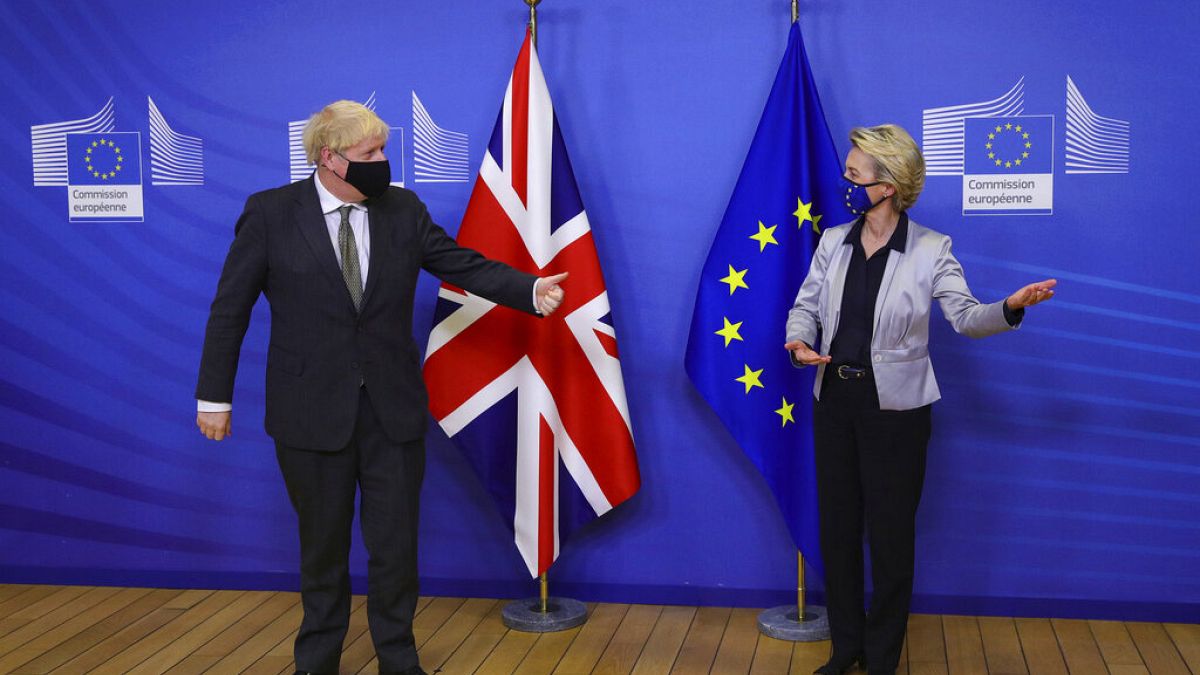Leaders say 'very large gaps remain' amid fears of no post-Brexit deal, following talks between UK PM Boris Johnson and EU Commission President Ursula von der Leyen in Brussels
Boris Johnson and Ursula von der Leyen have agreed they will take a "firm decision" on a post-Brexit trade deal by Sunday amid warnings that "very large gaps remain" in their negotiations.
The outcome came after the UK Prime Minister and European Commission chief met in Brussels for three hours of talks over dinner on Wednesday evening.
"We had a lively and interesting discussion on the state of play across the list of outstanding issues," von der Leyen said in a statement.
"We gained a clear understanding of each other's positions. They remain far apart."
Britain and the EU disagree on three major policy areas: European fishing rights in British waters, fairness in competition rules, and the enforcement of a trade agreement.
But the two leaders agreed their teams should meet for further talks beginning on Thursday before taking a "firm decision" by the end of the weekend.
UK media quoted a source close to Johnson as saying he "does not want to leave any route to a possible deal untested".
The source added: "Very large gaps remain between the two sides and it is still unclear whether these can be bridged."
Staring down a no-deal barrel
The clock is ticking to reach a deal as only three weeks remain before the transition period expires.
The UK's departure from the EU Single Market and Customs Union will bring major changes from January 1 come what may. But failure to strike an agreement on future relations would compound the economic rupture, causing further upheaval for businesses on either side of the English Channel.
On Thursday the European Commission unveiled targeted contingency measures for a no-deal Brexit to ensure basic air and road connectivity with the UK for six months following the end of the transition period.
EU countries had been putting pressure on the Commission to take the step to help businesses prepare.
The ball now goes back into the negotiators' court to try to achieve in three days what they have failed to manage all year.
However, they draw their mandate from national governments, and on the EU27 side the scope for flexibility is limited. A breakthrough is thought to require a political intervention, yet that did not happen on Wednesday night.
Johnson said before his meeting with the European Commission chief that "a good deal is still there to be done".
But hours earlier, he told MPs in parliament that the bloc is "insisting" on terms of dispute resolution and fishing rights that he could not agree to.
"They're saying the UK should be the only country in the world not to have sovereign control over its fishing waters. I don't believe that those are terms that any prime minister of this country should accept," he said.
These few days are a defining moment for Johnson's premiership, whose Brexit cheerleading played a huge part in the vote to leave the EU and then carried him on to Downing Street. The British government and its negotiators have been renewing appeals for the EU to respect the UK's "sovereignty". The test will be the extent to which Johnson is prepared to compromise to retain access to European markets.
Von der Leyen and the EU, meanwhile, are resolute in their defence of the EU's own "red lines", safeguarding the bloc's single market and protecting it from potentially unfair competition from the UK in the future. Several EU countries, notably France, have been putting pressure on the Commission not to cede too much ground.
Agreement over Northern Ireland
Major changes will kick in from the new year with or without a deal, when the UK leaves the EU's Single Market and Customs Union.
Failure to reach a deal on the future relationship would mean tariffs and other costly barriers to trade from January, and leave arrangements in many other areas in limbo, plunging EU-UK relations to a new low.
Tuesday brought some easing of tensions with the news that the EU and UK had reached agreement in principle on implementing new arrangements for Northern Ireland from 2021. These were set out in the divorce deal that took the UK out of the EU last January, and since then a UK-EU Joint Committee has been working on its implementation.
More details were given on Wednesday by UK minister Michael Gove which reassured Northern Ireland business groups to some extent.
As part of the latest agreement, announced on by its co-chairs, senior UK minister Michael Gove and European Commission Vice-President Maroš Šefčovič, the British government says it will withdraw contentious clauses from Brexit legislation that have caused a furore with the EU.
Measures in the UK Internal Market Bill concerning arrangements for Northern Ireland would have overridden parts of the binding EU divorce deal, breaching international law.
Other matters on EU agenda
The United Kingdom left the European Union last January but has continued to follow most EU rules during the transition period which expires on December 31. It will then leave the EU's trading structures and be considered a "third country".
Negotiators had initially tabled a deal for mid-October to allow enough time for it to be ratified by parliaments but the deadline was continuously pushed back.
With the European Council scheduled to meet on Thursday for a two-day summit, hope was that a deal would be approved by then so it could be discussed by the leaders of the 27 member states.
But for now, Brexit does not feature on the official summit agenda with Council President Charles Michel writing on Wednesday afternoon that "when it comes to relations with the UK, negotiations are on-going based on our common mandate."
"It is not the intention to plan a discussion on the matter. The President of the Commission will debrief us on the state of play," he said.
